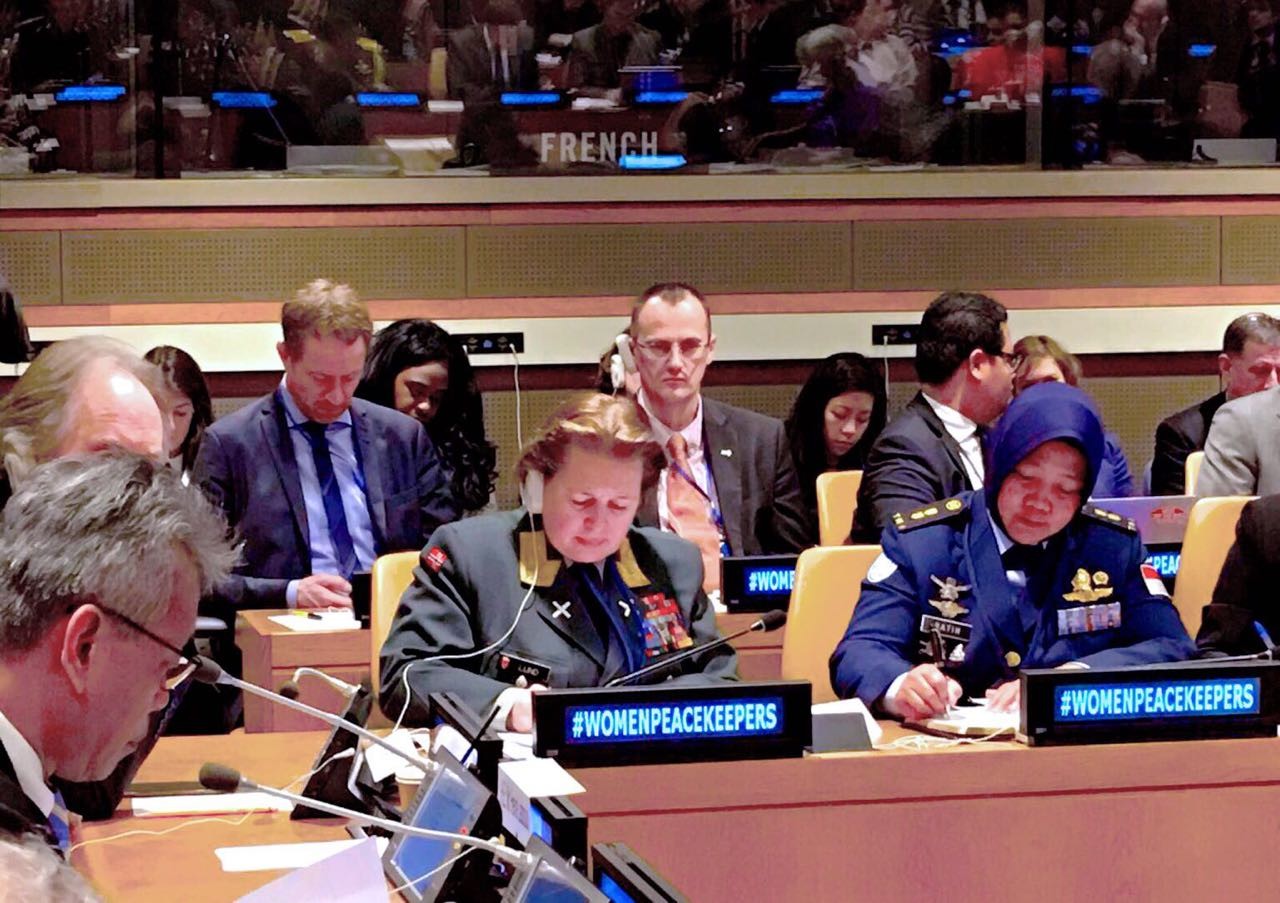Popular Reads
Top Results
Can't find what you're looking for?
View all search resultsPopular Reads
Top Results
Can't find what you're looking for?
View all search resultsChances rare for Indonesian women peacekeepers
Change text size
Gift Premium Articles
to Anyone
 Women of strength: Indonesia’s Lt. Col. Ratih Pusparini (right) and Norway’s Maj. Gen. Kristin Lund (center) attend a session of the United Nations’ Special Committee for Peacekeeping Operations (C-34), in New York, the US, last Wednesday.
(Courtesy of Foreign Ministry)
(Foreign Affairs Ministry/file)
Women of strength: Indonesia’s Lt. Col. Ratih Pusparini (right) and Norway’s Maj. Gen. Kristin Lund (center) attend a session of the United Nations’ Special Committee for Peacekeeping Operations (C-34), in New York, the US, last Wednesday.
(Courtesy of Foreign Ministry)
(Foreign Affairs Ministry/file)
D
espite increasing evidence that women play a vital role in post-conflict resolution and peacekeeping operations, Indonesian women are still not given enough opportunities to participate in such missions.
For the women of the Indonesian Military (TNI), one of the biggest challenges keeping them away from participating in United Nations peacekeeping missions is consent from their family.
“Stamped, written permission from their spouse is the most important thing to obtain before women can be deployed for peacekeeping missions,” said Lt. Col. Ratih Pusparini, a former UN peacekeeper from Indonesia, on Monday.
She argued that husbands and other family members were still too dismissive of women taking such positions, often overestimating the duties that came with military service.
“We are rarely deployed on the front line, and more about civic affairs: civilian-military coordination, interaction with UN staff and logistics — it is not a far cry from what we do in Jakarta,” Ratih told The Jakarta Post.
However, she also believes women should gradually be allowed the opportunity to serve on the field, making an example of her work as a gender adviser on one of her peacekeeping missions — Ratih has served for missions in Syria, Congo and Lebanon since 2008.
Besides traditional family values that shun women from practicing such “masculine” roles, language is also a big obstacle for women looking to contribute to world peace.
Adj. Sr. Commr. Yuli Cahyati, a former police adviser with the UN-African Union Mission in Darfur (UNAMID), said most women who applied to become individual police officers on UN peacekeeping missions stumbled in the English-language exams.
“I’ve always encouraged my juniors to work on their English skills, as it is one of the main factors to passing the selection process,” Yuli told the Post. “It is paramount for interacting with other visitors.”
Both Ratih and Yuli recently spoke at the UN headquarters in New York in a panel discussion on the role of women in peacekeeping operations (PKOs), which Indonesia hosted as part of its campaign to win a non-permanent seat on the UN Security Council for the 2019–2020 period.
With a constitutional mandate to partake in maintaining world peace, Indonesia underlined the importance of having more women deployed as peacekeepers, the country’s permanent representative to the UN, Trian Diansyah Djani, said recently.
“Women embedded in UN peacekeeping missions today will have a much more significant role to play in post-conflict areas around the world,” Trian told the discussion on the sidelines of the Feb. 22 session of the UN Special Committee for Peacekeeping Operations (C-34).
Women peacekeepers are particularly effective in areas where genders are segregated, or where there is a high occurrence of sexual violence, said Fitri Bintang Timur, a researcher with the Centre for Strategic and International Studies (CSIS).
“[As the most vulnerable group of internally displaced persons] women are too ashamed or traumatized to share their experiences with the male peacekeepers,” Fitri told the Post on Monday.
“That is why it is important for Indonesia to deploy more women peacekeepers; the [TNI’s] Garuda Contingent will have more opportunities to interact with locals and collect pertinent information for completing their duties.”
Indonesia has vowed to deploy 4,000 UN peacekeepers by 2019 and promote greater gender mainstreaming. According to the latest UN data, only 60 of the 2,872 Indonesian troops currently deployed are women, compared with the overall UN PKO total of 1,102 women.(jun)









